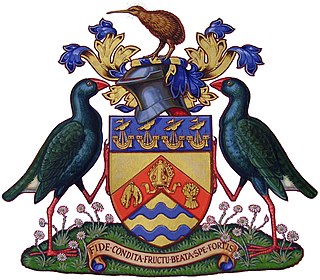
The Mayor of Christchurch is the head of the municipal government of Christchurch, New Zealand, and presides over the Christchurch City Council. The mayor is directly elected using a First Past the Post electoral system. The current mayor, Phil Mauger, was elected in the 2022 mayoral election. The current deputy mayor is Pauline Cotter.
The following lists events that happened during 1906 in New Zealand.
Waitemata was a New Zealand parliamentary electorate, from 1871 to 1946, and then from 1954 to 1978. It was represented by 18 members of parliament.
Manukau is a former New Zealand parliamentary electorate in the south Auckland Region. It existed from 1881 to 1978, with a break from 1938 to 1954. It was represented by nine Members of Parliament. Two by-elections were held in the electorate.
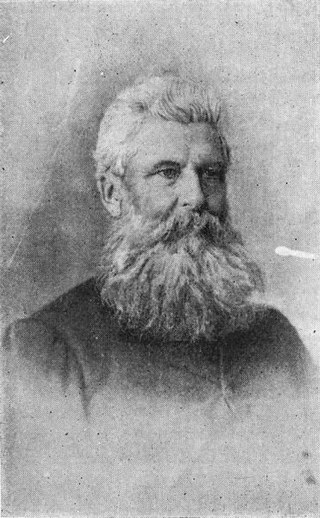
Charles Edward Button was a solicitor, Supreme Court judge, Mayor of Hokitika and later Birkenhead, and an independent conservative Member of Parliament in New Zealand. Born in Tasmania, he came to New Zealand with his wife in 1863. He first lived in Invercargill, then in Westland, and after a brief period in Christchurch, he settled in Auckland. He was an MP for two periods, and when he was first elected to Parliament, he beat his colleague, friend, political opponent, and later Premier Richard Seddon; this was the only election defeat ever suffered by Seddon.

Philip Aaron Philips was a New Zealand politician who served as the first mayor of Auckland City. He held the office from 1871 to 1874 and immediately prior to that, he was chairman of the City Board. He was a member of the Auckland Provincial Council and the Auckland Harbour Board.

Ernest Eden George, known as Eden George, was born in New South Wales and came to New Zealand as a young man. He made his career in photography and was active in Auckland and Dunedin, but mainly in Christchurch. Entrepreneurial, combative and confrontational, he entered the political scene. In his early life, he stood at five elections to the New Zealand Parliament, but he came last at every occasion. Surprisingly, he was elected Mayor of Christchurch in 1892 without, unlike all his predecessors, having ever served as a councillor on Christchurch City Council before. He had a most difficult year, was soundly beaten at the next election and told councillors that they "should forget him, as he would forget them". Indeed, in 1906, his was the only photo of all the city's ex mayors that was not on display in the mayor's office.

The 16th New Zealand Parliament was a term of the New Zealand Parliament. It was elected at the 1905 general election in December of that year.
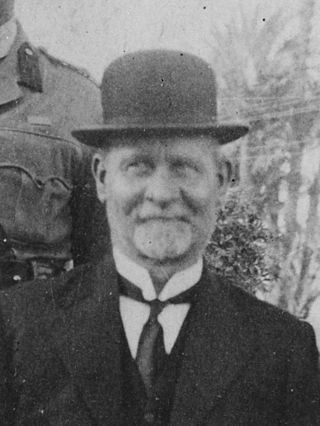
The mayor of Blenheim officiated over the borough of Blenheim, New Zealand. The office was created in 1869 when Blenheim became a borough, and ceased with the 1989 local government reforms, when Blenheim Borough was amalgamated with Picton Borough and Marlborough County Council to form Marlborough District. There were 31 mayors of Blenheim. The last mayor of Blenheim, Leo McKendry, was elected as the first mayor of Marlborough.
The Mayor of Grey, often referred to as the Mayor of Greymouth, officiates over the Grey District of New Zealand which is administered by the Grey District Council with its seat in Greymouth. The current Mayor is Tania Gibson. Two predecessors to this office were the Mayor of Greymouth, officiating over the Greymouth Borough Council from 1868, and from 1877 the chairman of the Grey County Council.
The Auckland East by-election was a by-election in the New Zealand electorate of Auckland East, an urban seat at the top of the North Island.
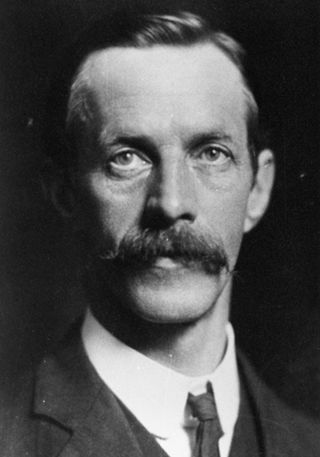
The 1912 Wellington City mayoral election was part of the New Zealand local elections held that same year. In 1911, elections were held for the Mayor of Wellington plus other local government positions. Thomas Wilford, the incumbent Mayor, resigned due to ill health and did not contest the ensuing election. David McLaren was elected to office as the new Mayor of Wellington, beating three other contenders and becoming the city's first Labour Mayor. The polling was conducted using the standard first-past-the-post electoral method.
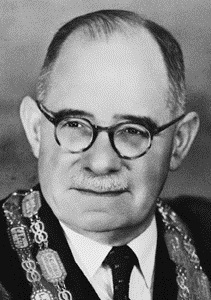
The 1944 Auckland City mayoral election was part of the New Zealand local elections held that same year. In 1944, elections were held for the Mayor of Auckland plus other local government positions including twenty-one city councillors. The polling was conducted using the standard first-past-the-post electoral method.

The 1953 Auckland City mayoral election was part of the New Zealand local elections held that same year. In 1953, elections were held for the Mayor of Auckland plus other local government positions including twenty-one city councillors. The polling was conducted using the standard first-past-the-post electoral method.

The 1950 Auckland City mayoral election was part of the New Zealand local elections held that same year. In 1950, elections were held for the Mayor of Auckland plus other local government positions including twenty-one city councillors. The polling was conducted using the standard first-past-the-post electoral method.
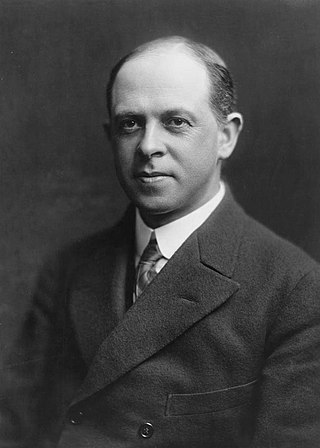
The 1938 Auckland City mayoral election was part of the New Zealand local elections held that same year. In 1938, elections were held for the Mayor of Auckland plus other local government positions including twenty-one city councillors. The polling was conducted using the standard first-past-the-post electoral method.

The 1941 Auckland City mayoral election was part of the New Zealand local elections held that same year. In 1941, elections were held for the Mayor of Auckland plus other local government positions including twenty-one city councillors. The polling was conducted using the standard first-past-the-post electoral method.
The 1910 Auckland City mayoral election was part of the New Zealand local elections held that same year. In 1910, elections were held for the Mayor of Auckland. The polling was conducted using the standard first-past-the-post electoral method.

The 1901 Auckland City mayoral election was part of the New Zealand local elections held that same year. Elections were held for the Mayor of Auckland on 24 April 1901. The previous mayor, David Goldie, was held in high regard by both the city councillors and the voters but he did not contest the poll; as a temperance advocate, he did not want to toast the Duke and Duchess of Cornwall and York who were to visit in June 1901 with alcohol. John Logan Campbell, who had become regarded as the Father of Auckland, was asked to represent the city. Campbell agreed on the proviso that he would only take on representative functions, with most mayoral tasks taken on by a deputy, and resign after the royal visit. Against general expectation, the mayoralty was contested by a brewer—Daniel Arkell—who had never held any public roles. Campbell won the election with nearly 80% of the votes, with senior city councillor Alfred Kidd deputising for him. Upon Campbell's resignation in July 1901, Kidd was elected the next mayor by his fellow city councillors.













